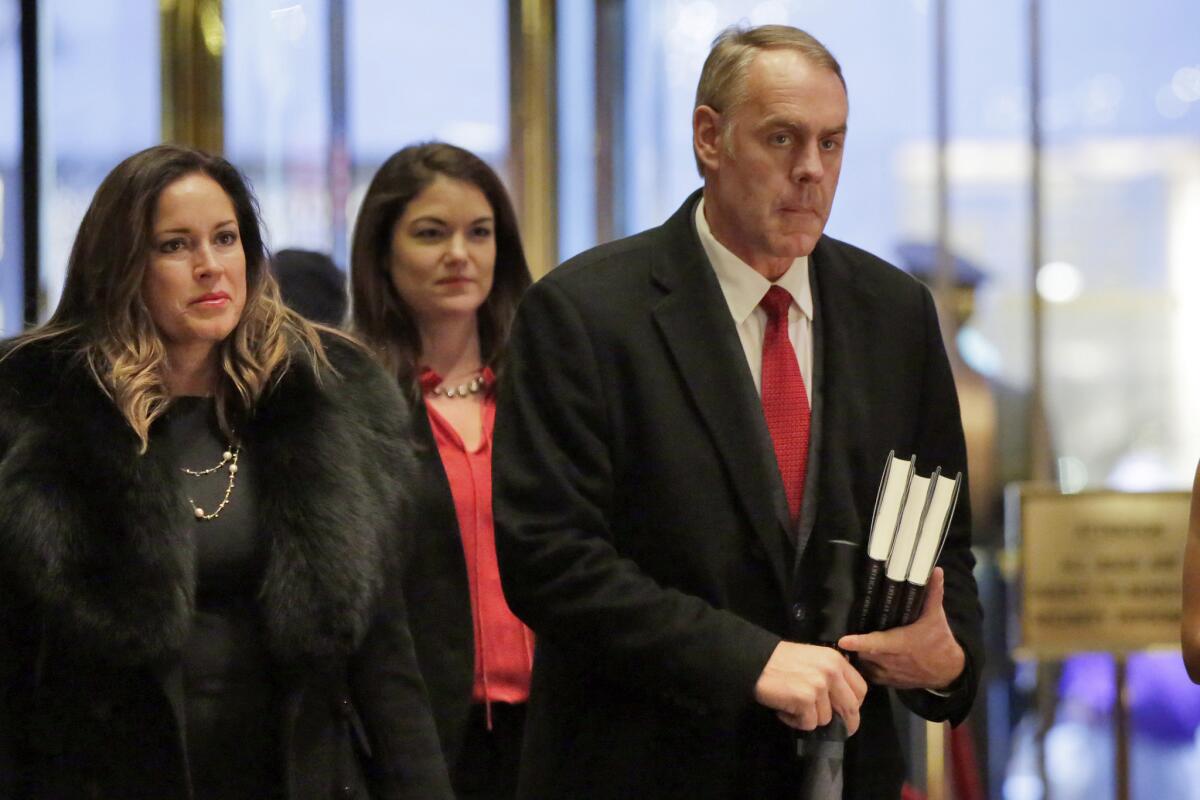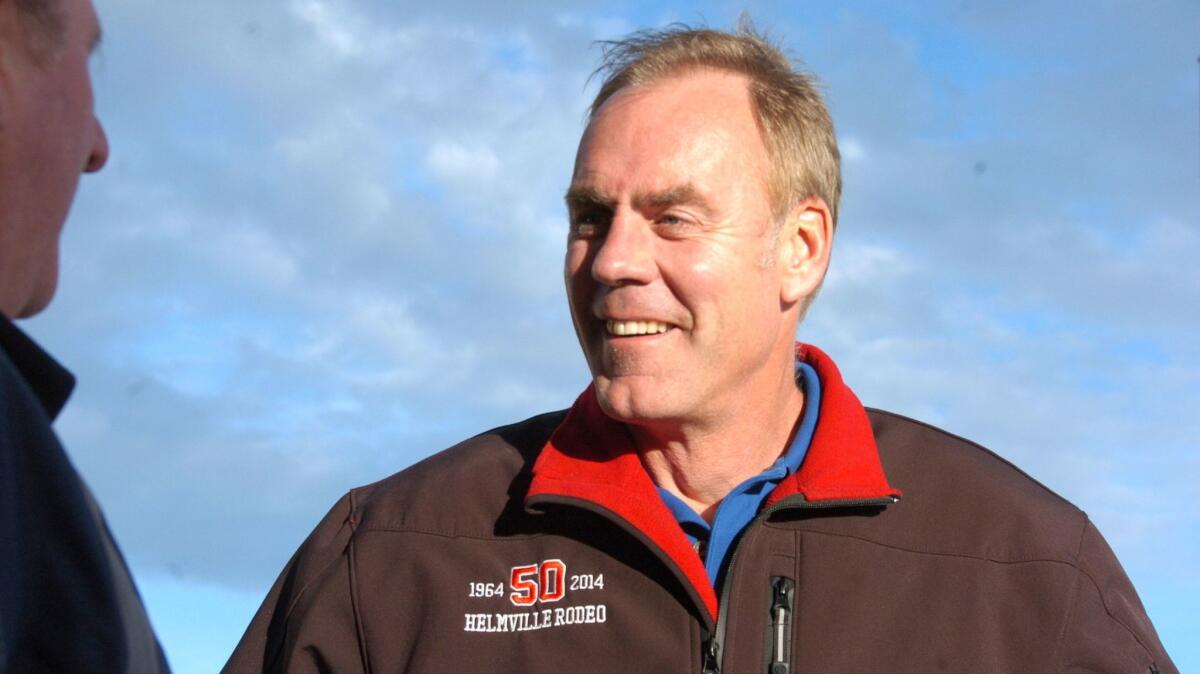Ryan Zinke, Trump’s pick as Interior secretary, is all over the map on some key issues

Long before Ryan Zinke trained elite Navy Seals, served in Congress or became Donald Trump’s choice for secretary of Interior, he was a boy who swam and caught crayfish in the Whitefish River in his native Montana.
When it came time to choose his Eagle Scout project, he stopped playing in the river and started studying it.
“It was the first time I ever looked at the environment with a critical eye,” he wrote in his memoir, published last month, “American Commander.”
“The project I chose was to follow the banks of the river and look at the sources of any pollution or runoff…. I took pictures of the railroad’s oil holding ponds and looked at how the ponds of oil would overflow into the river. I looked at the storm drains dumping in the river, took soil samples, and proposed solutions to the degree a young student could.
“When an old logger downstream was mowing his lawn and caused a spark, which caused the river to catch on fire, I knew the source. The project promoted a lifetime of conservation values.”
Yet the depth of those conservation values has come into serious question since Zinke, a former Montana state lawmaker serving his first term in the House, entered politics. This week, environmental groups have expressed alarm at the prospect of him presiding over Interior, an agency with powerful sway over the fate of America’s public lands, at a time when Trump has said he plans to roll back regulations in order to unleash a wave of fossil-fuel energy production.
In an interview on Wednesday, the day before his appointment was announced, Zinke discussed changes he wanted to see in the management of public lands as well as his view that climate change science is “unsettled.”
“When you’re asked by the president to serve, it’s awfully hard to say no, and I’m loyal,” Zinke said.
Under the current secretary, Sally Jewell, Interior has been at the center of President Obama’s efforts to combat climate change. The agency employs 70,000 people and manages millions of acres of federal land, most of them in the West. It includes the National Park Service, the Bureau of Indian Affairs and the Bureau of Reclamation, which oversees management of the drought-stricken Colorado River and the nation’s largest reservoir, Lake Mead. The role of secretary has traditionally been filled by Westerners versed in the region’s heated debates over land use.
Zinke says he believes in “multiple uses” for public lands and preserving them for posterity, yet what he has said and how he has voted have been hard to reconcile at times, according to many conservation groups.

“Congressman Ryan Zinke has been all over the map on public lands,” Jennifer Rokala, executive director of the nonpartisan Center for Western Priorities, wrote Tuesday.
Rokala cited a pledge Zinke signed in 2012 to “legally and administratively oppose” federal agencies and “restore the rightful powers over the land to the state and private ownership,” an idea fiercely opposed by conservationists.
This year, she noted, Zinke voted for a bill that would have transferred control of millions of acres of national forest lands to states. However, he also resigned as a delegate to the Republican National Convention because the party platform supported transferring some public lands to states.
The League of Conservation Voters has given Zinke a 3% lifetime score.
While Zinke has supported preserving the federal Land and Water Conservation Fund, which is viewed as sacrosanct by many conservationists, he has also opposed a new rule to reduce the emission of the greenhouse gas methane during energy production on public land and a moratorium on new coal leasing. He praised a preliminary federal study that said hydraulic fracturing to produce oil and gas did not cause systemic damage to drinking water — but that finding was reversed in a final report this week.
In his memoir, co-written with Scott McEwen, who also co-wrote the bestselling “American Sniper,” Zinke, 55, praised Theodore Roosevelt for setting aside land under the Antiquities Act and “wrestling 230 million acres away from timber and railroad interests and placing the land under federal protection.”
But Zinke also wrote that Roosevelt has been misrepresented over the last century, saying that “multiple use has come under fire as special interest groups have misused policy to successfully block resource management, reduce public access, and even lock out local communities from being part of the land use process.” He has been critical of certain logging restrictions, road closures and bans on mountain biking in some areas.
Zinke, who received an undergraduate degree in geology from the University of Oregon in 1984, has questioned the broad scientific consensus that climate change is happening and that humans are largely the cause of it.
In the interview on Wednesday, he said, “The climate is changing, I don’t think you can deny that. But climate has always changed.”
Describing himself as “a former geologist,” he first said, “I don’t think there’s any question that man has had an influence” on climate change. Later, he said that influence was “likely,” but that “what that influence is, exactly, is still under scrutiny.”
He was critical of Obama administration policies that require projects on public lands to be assessed for their potential climate impacts.
“In this next administration, there will be a review of job-killing regulation that is not based on sound science,” he said.
Zinke said that he supported the National Environmental Policy Act, which some conservatives criticize as too restrictive, and that he wanted to see major improvements in infrastructure and employee morale in the National Park Service. He said he wanted to “make sure that our parks are world class.”
After college, Zinke spent 23 years in the Navy SEALs, rising to become a commander before leaving the service in 2008. He was elected to the state Senate in 2008 and to Congress in 2014. The front of his campaign bus featured the symbol of the Navy SEALs. The logo on his congressional website calls him “Commander,” not Congressman. His policies shifted rightward as he moved from the state legislature to Congress. In his 2014 campaign for Congress, he called Hillary Clinton “the real enemy” and “the Antichrist.”
“A lot of what a military officer does is not just leading troops in combat,” Zinke told The Times that year. “It’s also doing budgets. It’s solving complex problems. If you can sit down with warlords, you can certainly sit down with different parties and folks with different interests and come out with an amenable solution.”
UPDATES:
10:00 a.m. Dec. 15: This article has been updated with Zinke’s appointment.
This article was originally posted at 3 p.m. on Dec. 14.
More to Read
Sign up for Essential California
The most important California stories and recommendations in your inbox every morning.
You may occasionally receive promotional content from the Los Angeles Times.











